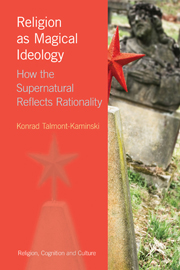3 - The superempirical
Summary
We have seen, thus far, that to do justice to the values of the Enlightenment it is necessary to move away from thinking of reason and religion as fundamental elements of explanations offered for cultural and psychological processes. Instead, these categories — if they are to retain any meaning — must be spelt out in terms of concrete cultural and cognitive phenomena that tend to take on somewhat different forms under various conditions. We have also seen that all processes of discovery, be they evolutionary or cognitive, share certain basic characteristics as a result of functioning in the face of the fundamental epistemic limitation originally identified by David Hume. One of those characteristics that we focused on due to its particular relevance to understanding supernatural beliefs and practices was the ubiquity of by-products that such processes generate. This served to explain the pervasiveness and the durability of supernatural belief and practice. Having understood that basic point, it is now time to develop an understanding of such beliefs and practices that is informed by the evolutionary and cognitive work that has recently been undertaken. The focus in this chapter is on the basis for the distinction between the two categories that the supernatural is usually thought to be made up of.
Adequate accounts of the relationship between magic and religion have proved as elusive as the entities to which they refer.
- Type
- Chapter
- Information
- Religion as Magical IdeologyHow the Supernatural Reflects Rationality, pp. 43 - 72Publisher: Acumen PublishingPrint publication year: 2013



